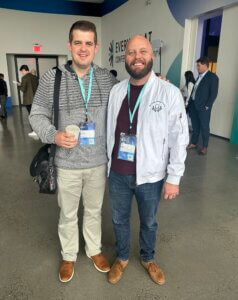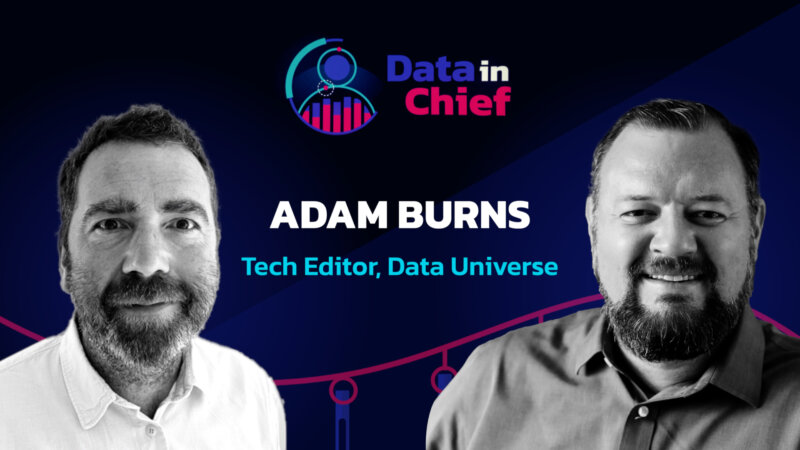
Articles
“We Were Made for This Moment:” Dataiku Positions Itself as the Platform for Everyday AI
My Honest Take on the Everyday AI Conference
Fall conference season is upon us. Companies have had all summer to retool their conference slates and product positioning to be everything AI. Dataiku took it one step further and rebranded the hype as “Everyday AI.”
The two day Everything AI NY conference had two distinct themes: leaders and practitioners. The prominence of AI in these two tracks was stark.
Day 1, the regular Everday AI conference, was directed at the leadership persona. Throughout the talks, they focused on how businesses are getting value out of artificial intelligence now, instead of the moonshot cases that are dominating social media feeds.
Keynote + Panel 1: Speeding AI Adoption
The keynote from Dataiku CEO, Florian Douetteau, started with a bold thesis: “We were made for this moment.” He emphasized the need to augment human cognition with AI instead of relying purely on our own. Lost in all of this hype was the recognition that we’ve depended on machines to augment our human faculties for centuries… but I digress.
From the company’s perspective, three pillars drive AI, and more broadly data product and adoption: Democratize, Accelerate and Trust.
Democratization
Dataiku has built a platform for the experts to do their work and then make those tools accessible to a wider audience. With tools ranging from drag and drop to Python, R, and SQL, they highlighted their ability to bring the power of data to the masses, with the ultimate goal of AI.
Accelerate
By building a single, comprehensive analytics platform, Dataiku believes they can accelerate analytics and AI adoption across an organization. They highlighted their features to widely share pre-built projects and Elastic Compute Cloud native platform.
Trust
Few people will blindly trust a data product without the right social cachet. Dataiku showed their features to enable governance, guardrails (especially with AI), and native explainability of a data pipeline or model.
The opening keynote balanced Dataiku’s perspective with those from key customers including BNY Mellon, Consumer Reports, and Regeneron.

Keynote + Panel 2 – LLM Mesh
Dataiku used the conference to launch their newest feature: LLM Mesh. The feature launch included a panel of industry experts and partners gathered to discuss the current state of AI, its future, and how organizations can harness its power.
Managing and Switching Providers in the LLM Space
One essential aspect discussed was the ability to manage and switch between different AI service providers. In the rapidly changing landscape of AI, it’s essential to keep your options open. Dataiku’s platform allows users to control which Large Language Models (LLMs) they use, depending on use case, data privacy, and other dimensions. This means that for highly sensitive data, you can opt to stick with models within your private cloud, while less sensitive data can leverage cloud-hosted models. Flexibility in choosing providers is paramount as organizations navigate the dynamic AI environment.
Feature Launch Partners
The new feature session included their launch partners: Snowflake, NVIDIA, Pinecone, and AI21 Labs.
Current State of AI
During panel discussions, experts shared their insights on the current state of AI. Edo Liberty from Pinecone emphasized that AI discussions are now happening at the board level, indicating its growing significance in business strategy. Pankaj Dugar of AI21 Labs noted that while AI is transformative, it’s essential to focus on profitable and practical use cases rather than expecting a revolution every 48 hours.
Building an LLM
Building an LLM doesn’t require an extensive timeline. According to Edo, you can kickstart your LLM project in a matter of weeks and quickly gain valuable insights. Pankaj highlighted the importance of automating mundane but valuable tasks within enterprises, emphasizing that this is where the true potential of AI lies.
What Business Leaders Should Focus On
Malcolm Demayo of NVIDIA offered valuable advice for business leaders. He stressed the need to advance computing capabilities, as computing limitations are a significant challenge. Additionally, recruiting and retaining data scientists and upskilling existing talent should be on every organization’s radar.
Edo highlighted the importance of acquiring new skills for LLMs and Generative AI. He urged business leaders to strategize on building talent, identifying applications, and continually innovating in these areas.
Snowflake’s Takeaway
Snowflake was given their own session, highlighting the depth of their partnership and integration with Dataiku.
They emphasized the importance of having real experiences with AI APIs to understand their capabilities fully. They underlined that AI is not just a fact database; it’s a powerful reasoning engine.
Key Use Cases for Snowflake
Snowflake shared some key use cases for its AI offerings, including being a conversational copilot for analytics, accelerating employee onboarding, and document analysis and summarization. Their focus was on enabling organizations to deploy and protect private user data through their platform.
In conclusion, the LLM Mesh reveal offered valuable insights into the current state and future of AI. Business leaders should prioritize flexibility, automation of valuable tasks, skill development, and keeping up with advancements in computing to stay competitive in the evolving world of AI. While the session had a sales-oriented tone at times, it provided a glimpse into the collaborative efforts driving the AI industry forward.
Breakout Session 2: Perdue Farms – Manufacturing and Supply Chain Transformation
In this enlightening session, Perdue Farms shared their journey in leveraging AI and machine learning (ML) to address the challenges posed by the pandemic. Their primary goal? Streamlining their manufacturing and supply chain processes by eliminating multiple touch points. To achieve this, they harnessed the power of Dataiku and Snowflake, delivered through an analytics Center of Excellence (COE).
The key takeaway here was their approach to removing roadblocks from a COE perspective. Perdue created a Lakehouse (powered by Databricks), blending the concepts of a Data Lake and Warehouse, and seamlessly combined business expertise with COE’s technical acumen. They assigned personas for each team member, both in the business and the COE, fostering collaboration. Data engineers played a crucial role as inspectors, ensuring compliance with best practices and standards. By partnering with a consulting firm for technical support and scaling to ten businesses within 24 months, Perdue demonstrated the importance of building trust through efficient project deployment. Instead of overhauling their business, they improved the existing analysts’ efficiency and value, focusing on trust and ROI forecasting. Ultimately, their success rested on the belief that people and trust are fundamental to AI and ML-driven transformations.
Data Culture: Insights from Mercado Libre
In a session focused on creating a data-driven culture, Mercado Libre shared valuable actions and strategies. The core message was clear: fostering a data-driven culture requires intentional effort.
Mercado Libre initiated a “Data Driven Index” for individuals to measure their progress towards data proficiency. They also introduced “Data Driven Week,” a three-day intensive push for upskilling and adoption. To reinforce this culture, they appointed data champions within the business, collaborated with HR to create data-focused OKRs (Objectives and Key Results) for training, and lived by the Argentinian phrase “We eat the fish we sell.” By actively practicing what they preach, they set the tone for a data-driven organization. An essential element was the creation of a Data Culture Team, including HR to ensure buy-in from all stakeholders.
Harnessing Real-World AI: Insights, Innovations, and Impacts
The Everyday AI conference emphasized real-world applicability and current advancements in AI, focusing on tangible benefits for businesses. Central to the conference was Dataiku’s LLM Mesh feature launch, signifying the importance of flexibility and provider-choice in today’s AI landscape. Key conference themes included accelerating AI adoption, building trust, and ensuring data democratization. Leaders highlighted the significance of AI in business strategy, the need for continual skill development, and fostering a data-driven culture. In practice, businesses like Perdue Farms showcased leveraging AI for operational efficiencies, while Mercado Libre shed light on the path to embedding a data-driven culture. Across sessions, a consistent message emerged: While AI is evolving, its success in business hinges on people, trust, and real-world applications.





